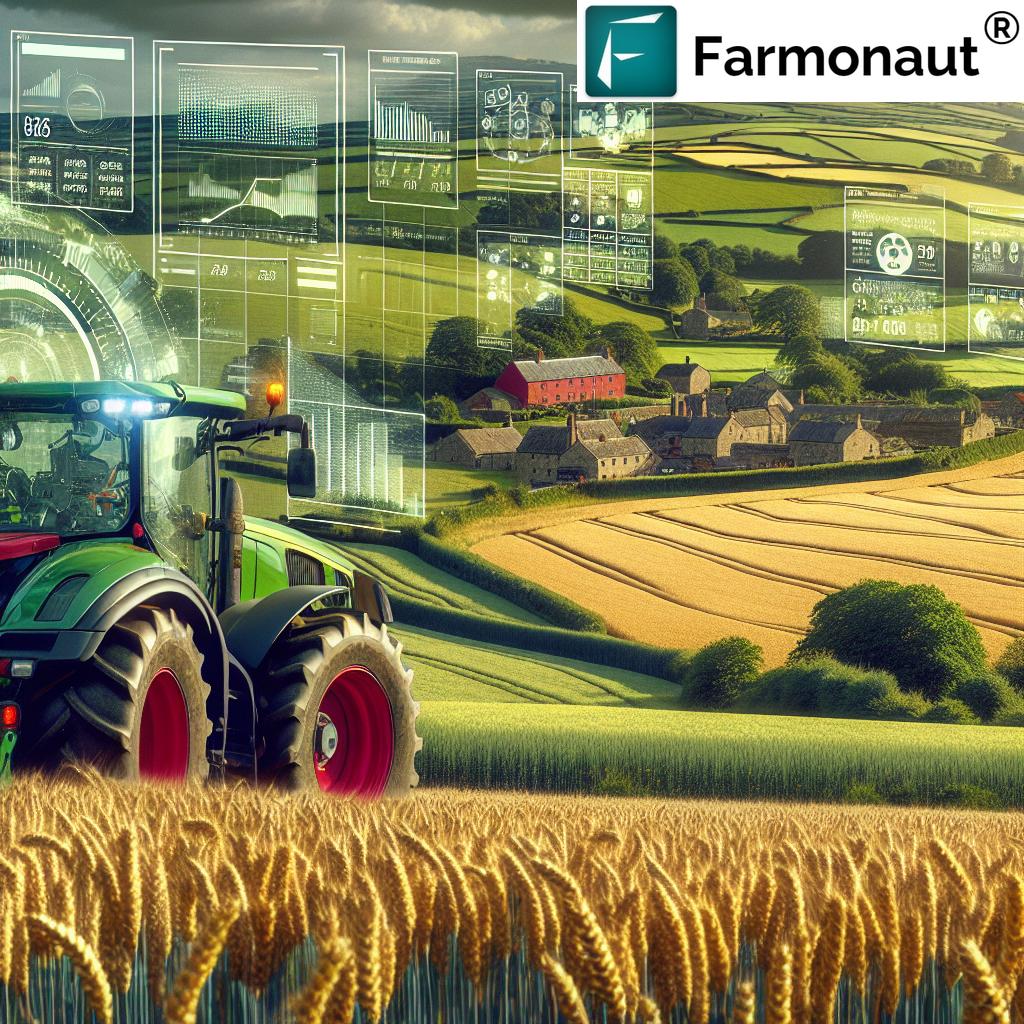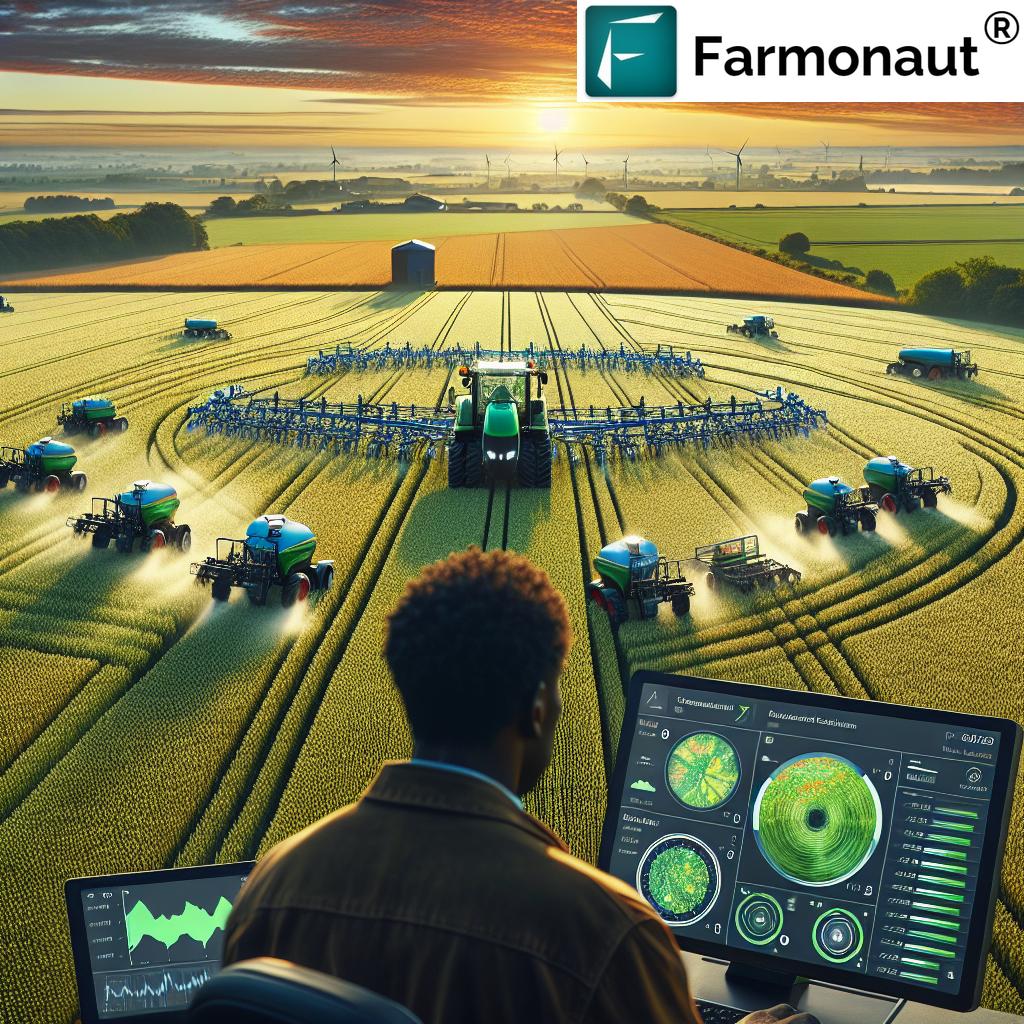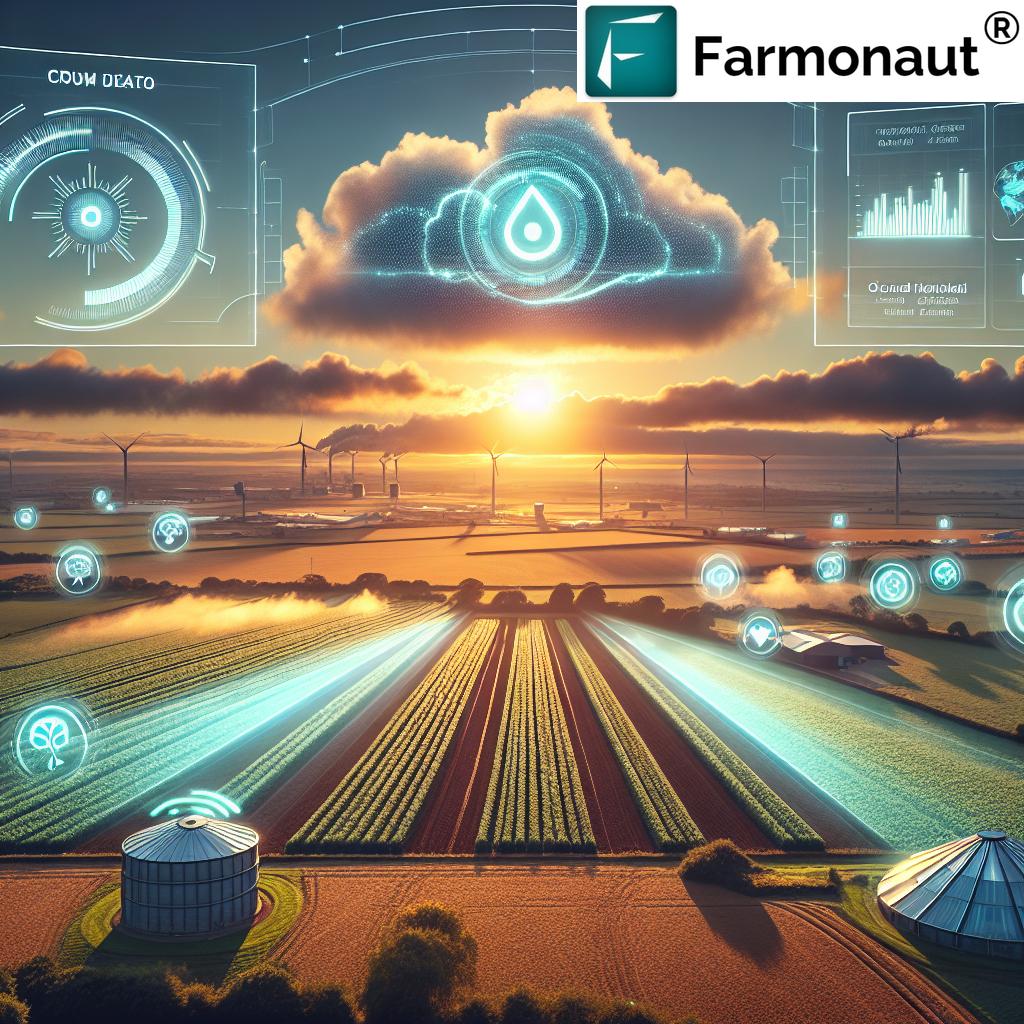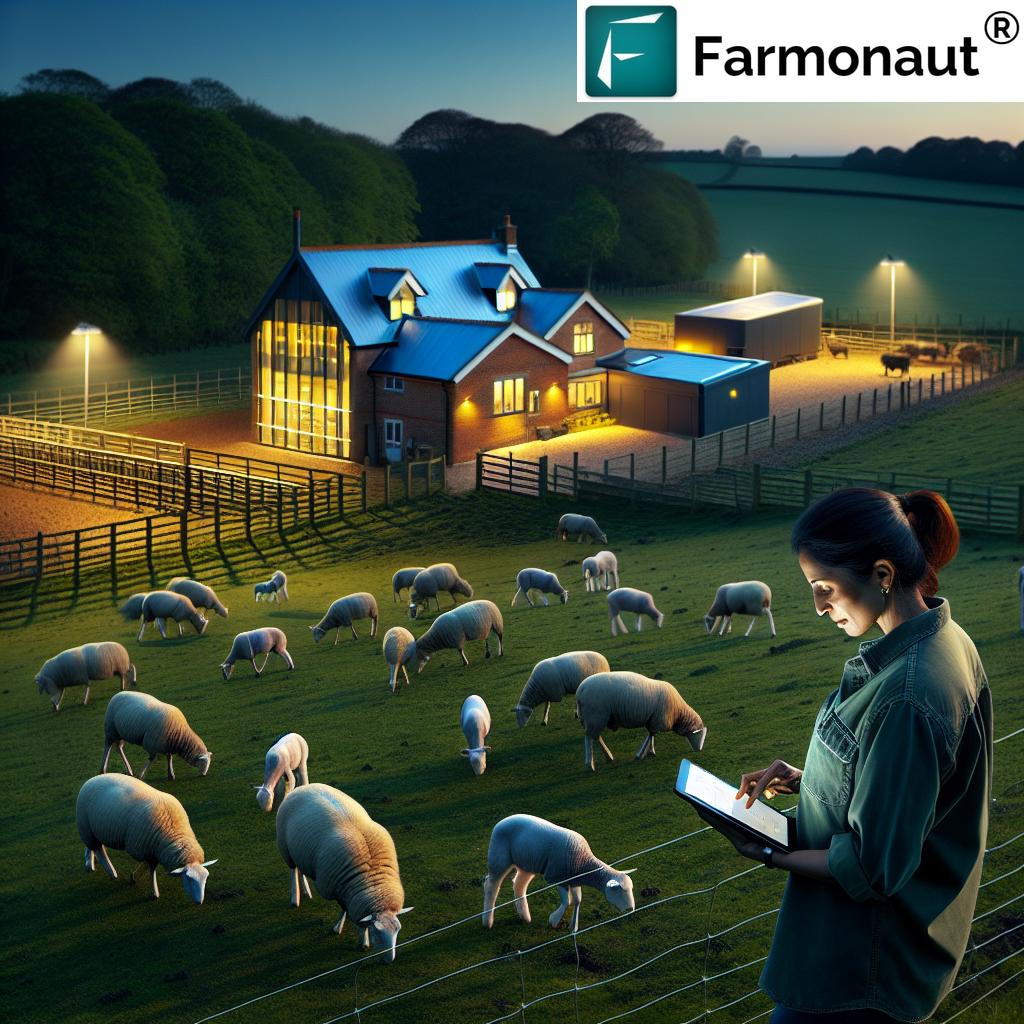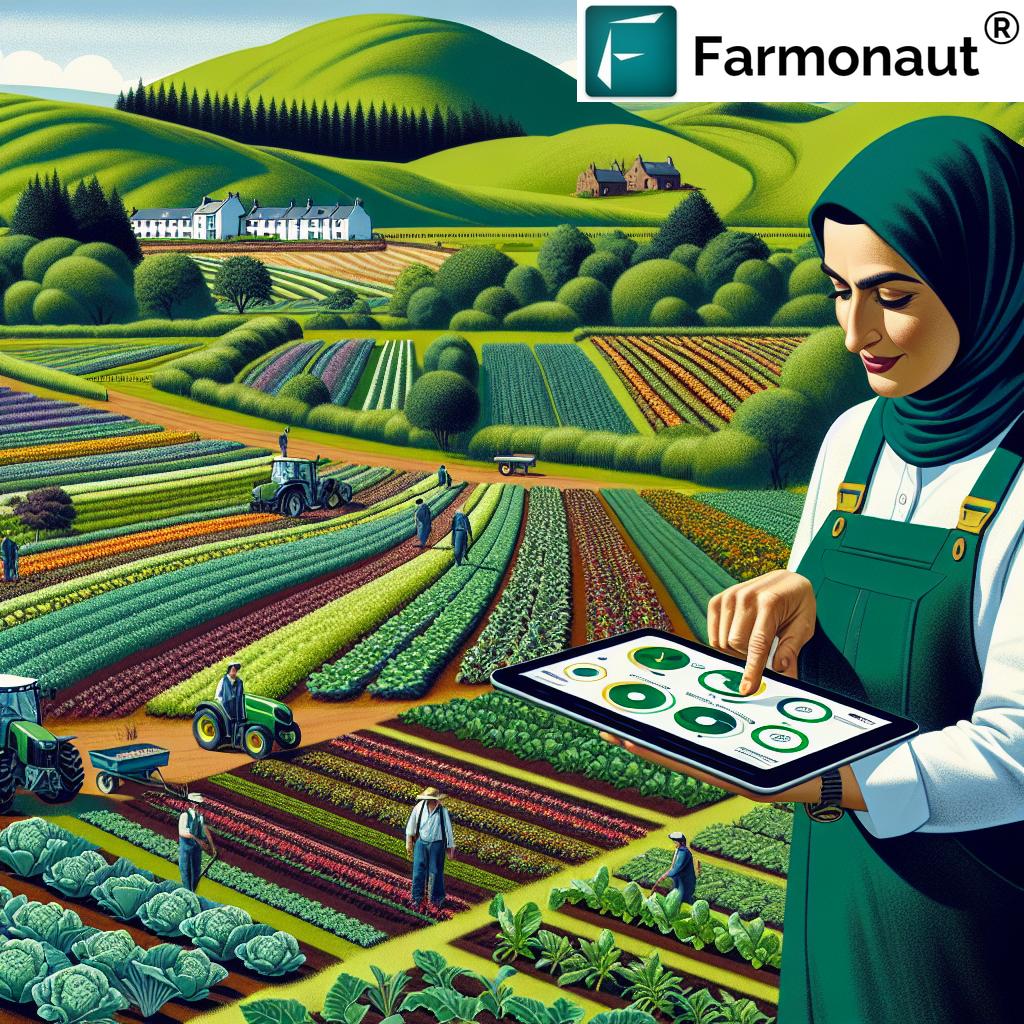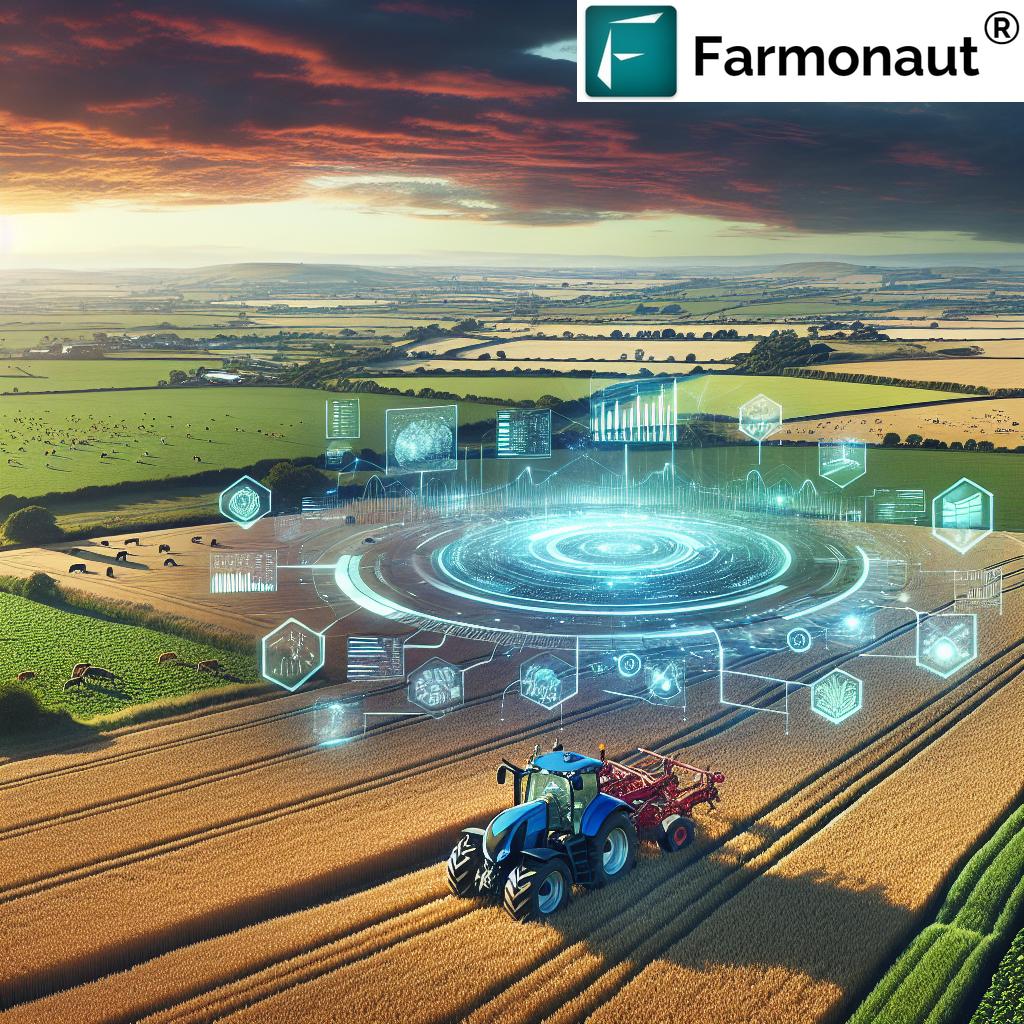UK Arable Crop Sector: Precision Farming Breakthroughs and Sustainable Agriculture Innovations for 2023
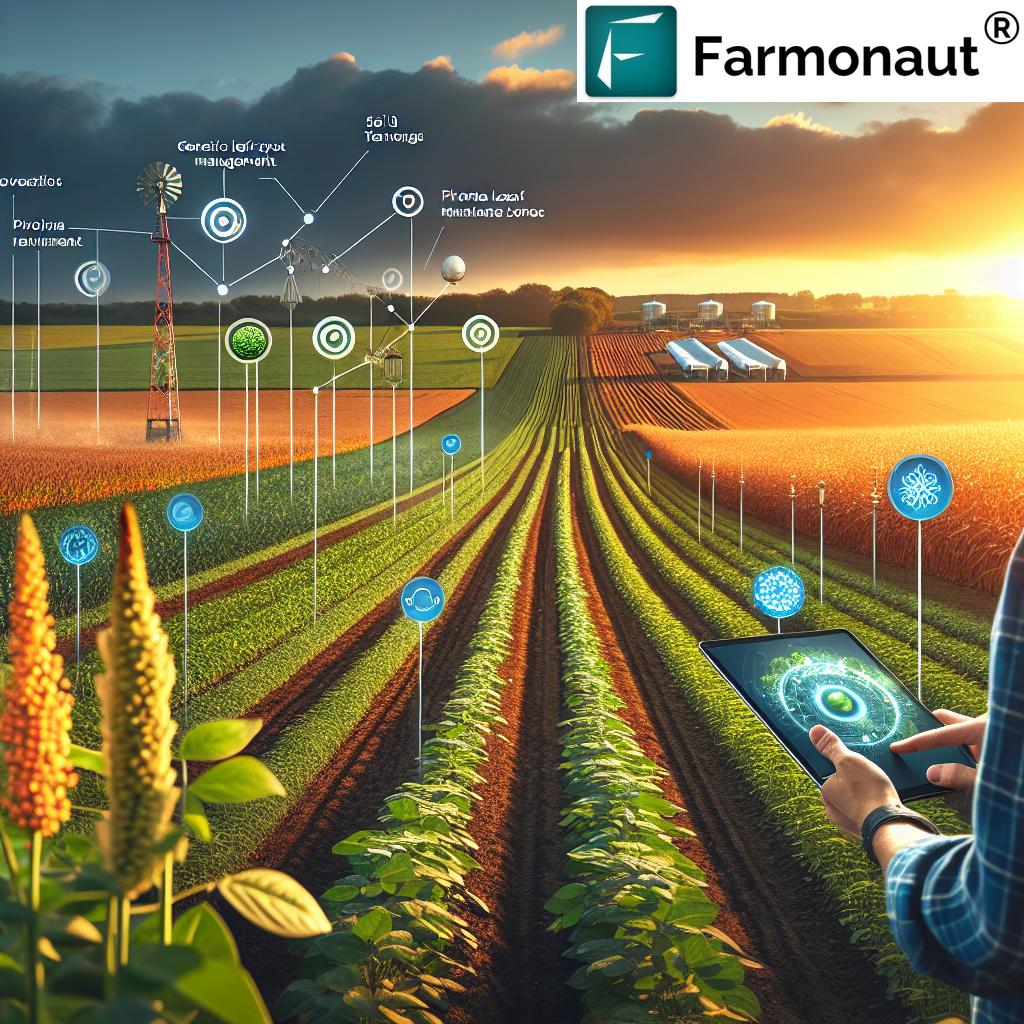
“The UK invested £3 million in developing climate-resilient legumes to address agricultural challenges in 2023.”
As we delve into the exciting world of UK arable crop innovations for 2023, we’re thrilled to share the latest breakthroughs in precision farming techniques and sustainable agriculture practices. This September brings a wave of transformative developments that are reshaping the landscape of British farming. From cutting-edge genetic technology to revolutionary farm data analytics, the arable crop sector is experiencing a renaissance that promises to boost productivity, enhance sustainability, and fortify our rural economies.
In this comprehensive exploration, we’ll uncover how these advancements are not just theoretical concepts but practical solutions being implemented across farms throughout the United Kingdom. We’ll examine the pivotal role of precision breeding in creating climate-resilient crops, dive into the intricacies of agricultural disease management, and spotlight the emerging export opportunities for innovative growers.
Join us as we navigate through the fields of progress, where technology and tradition merge to cultivate a more prosperous and sustainable future for UK agriculture. Whether you’re a seasoned farmer, an agri-tech enthusiast, or simply curious about the future of food production, this blog post will provide you with valuable insights into the cutting-edge developments shaping our arable crop sector.
Precision Farming: The New Frontier of UK Agriculture
Precision farming techniques have revolutionized the way we approach arable crop management. In 2023, we’re witnessing an unprecedented integration of technology into everyday farming practices, enabling farmers to make data-driven decisions with pinpoint accuracy.
- Satellite-Based Crop Monitoring: Advanced satellite imagery is now being used to assess crop health, soil moisture levels, and predict yields with remarkable precision.
- IoT Sensors and Big Data: The deployment of Internet of Things (IoT) sensors across fields is generating vast amounts of real-time data, allowing for micro-management of crop conditions.
- AI-Powered Decision Support: Artificial Intelligence algorithms are processing complex datasets to provide farmers with actionable insights for optimizing resource use and maximizing yields.
These precision farming technologies are not just improving efficiency; they’re also contributing significantly to sustainable agriculture practices by reducing waste and minimizing the environmental impact of farming operations.
Genetic Technology: A Game-Changer for UK Crops
The UK government’s support for genetic technology in farming marks a significant milestone in our agricultural journey. New legislation is paving the way for precision breeding techniques that promise to enhance crop resilience and productivity.
- Enhanced Crop Traits: Genetic editing allows for the development of crops with improved drought tolerance, disease resistance, and nutritional profiles.
- Reduced Environmental Impact: By creating plants that require fewer pesticides and water, genetic technology is aligning with sustainable agriculture goals.
- Faster Breeding Cycles: Precision breeding techniques can accelerate the development of new varieties, allowing the sector to respond more quickly to changing environmental conditions and market demands.
This genetic revolution is not just about creating ‘super crops’; it’s about developing sustainable, resilient farming systems that can withstand the challenges of climate change while meeting the growing global demand for food.
Climate-Resilient Crops: Securing the Future of UK Agriculture
In response to the pressing challenges posed by climate change, the UK has made significant strides in developing climate-resilient crops. This initiative is crucial for maintaining food security and stabilizing the arable crop sector in the face of increasingly unpredictable weather patterns.
- Investment in Research: A £3 million investment in developing climate-resilient legumes showcases the UK’s commitment to future-proofing its agriculture.
- Drought-Tolerant Varieties: Scientists are working on creating crop varieties that can thrive with less water, a vital trait as water scarcity becomes more prevalent.
- Heat-Resistant Strains: As temperatures rise, crops that can withstand higher heat levels without compromising yield are being developed.
- Pest and Disease Resistance: Climate change is altering pest and disease patterns, making it essential to breed crops with enhanced natural defenses.
These climate-resilient crops are not just a scientific achievement; they represent a crucial step towards ensuring the long-term viability of UK farming and food production.
Explore Farmonaut’s Satellite API for advanced crop monitoring
Farm Data Analytics: Harnessing the Power of Information
The agricultural sector is experiencing a data revolution, with farm data analytics playing a pivotal role in shaping modern farming practices. This wealth of information is empowering farmers to make more informed decisions and optimize their operations like never before.
- Historical Data Insights: With fifty years of arable disease data now available to farmers, long-term trends can be analyzed to predict and mitigate future challenges.
- Real-Time Monitoring: Advanced sensors and satellite imagery provide up-to-the-minute data on crop health, soil conditions, and weather patterns.
- Predictive Analytics: By leveraging machine learning algorithms, farmers can forecast potential issues and take preemptive action to protect their crops.
- Yield Optimization: Data-driven insights allow for precise application of inputs, maximizing yield while minimizing waste and environmental impact.
The integration of farm data analytics into arable crop management is not just improving current practices; it’s laying the groundwork for a more resilient and sustainable agricultural future.
“Fifty years of arable disease data is now available to UK farmers, enhancing crop management strategies.”
Agricultural Disease Management: A New Era of Vigilance
Effective agricultural disease management is crucial for maintaining healthy crops and ensuring food security. In 2023, we’re seeing innovative approaches that combine traditional knowledge with cutting-edge technology to combat plant diseases more effectively than ever before.
- Early Detection Systems: Advanced imaging technology and AI algorithms are enabling the early identification of disease symptoms, allowing for swift intervention.
- Integrated Pest Management (IPM): Holistic approaches that combine biological, cultural, and chemical control methods are gaining traction, reducing reliance on pesticides.
- Phoma Leaf Spot Monitoring: The unpredictable emergence of phoma leaf spot has led to enhanced surveillance techniques, particularly crucial for autumn harvests.
- Precision Application: Targeted application of treatments using GPS-guided machinery ensures that interventions are precise and minimally invasive.
These advancements in disease management are not only protecting crops but also contributing to more sustainable farming practices by reducing the overall use of chemical interventions.
Access Farmonaut’s API Developer Docs for integrating advanced agricultural insights
Sustainable Agriculture Practices: Nurturing the Land for Future Generations
Sustainability is at the forefront of agricultural innovation in 2023. The UK arable crop sector is embracing practices that not only yield bountiful harvests but also preserve and enhance the environment for future generations.
- Conservation Tillage: Minimizing soil disturbance helps maintain soil structure, reduce erosion, and improve water retention.
- Cover Cropping: Planting cover crops between harvest and sowing periods protects soil, improves fertility, and enhances biodiversity.
- Precision Irrigation: Water-saving technologies like drip irrigation and soil moisture sensors optimize water use efficiency.
- Agroforestry: Integrating trees with crops creates diverse ecosystems that improve soil health and provide additional income streams.
- Organic Farming Techniques: The adoption of organic methods is growing, reducing reliance on synthetic inputs and promoting natural pest control.
These sustainable agriculture practices are not just environmentally friendly; they’re proving to be economically viable, often leading to reduced input costs and improved long-term productivity.
Oilseed Crop Production: A Renaissance in British Fields
The UK is witnessing a resurgence in oilseed crop production, driven by both domestic demand and export opportunities. This revival is breathing new life into the arable sector and diversifying farm incomes.
- Rapeseed Renaissance: Despite challenges, rapeseed remains a key oilseed crop, with new varieties offering improved pest resistance and yield potential.
- Alternative Oilseeds: Crops like linseed and camelina are gaining popularity, offering new rotational options and market opportunities.
- Sustainable Oil Production: The push for renewable fuels is driving innovation in oilseed processing and utilization.
- Value-Added Products: Farmers are exploring niche markets for cold-pressed oils and other specialty products, increasing profit margins.
The revitalization of oilseed crop production is not just about increasing hectarage; it’s about creating a more resilient and diverse arable sector that can adapt to changing market demands and environmental conditions.
Export Opportunities: UK Arable Crops on the Global Stage
The UK arable crop sector is increasingly looking beyond its borders, with new export opportunities emerging for innovative and high-quality products. This global outlook is opening up new revenue streams and driving innovation in crop production and processing.
- Beetroot Boom: UK beetroot growers are finding new markets abroad, capitalizing on the crop’s superfood status and versatility.
- Specialty Grains: Niche markets for heritage wheat varieties and specialty grains are providing premium export opportunities.
- Value-Added Exports: Processed and packaged products are allowing farmers to capture more value from their crops in international markets.
- Sustainable Credentials: The UK’s commitment to sustainable farming practices is becoming a selling point in environmentally conscious markets.
These export opportunities are not just about selling surplus produce; they’re about positioning UK agriculture as a global leader in quality, innovation, and sustainability.
Low-Carbon Innovations: Sustainable Materials from the Field
The arable crop sector is playing a crucial role in the development of low-carbon materials, contributing to the broader goal of reducing the UK’s carbon footprint. Innovative uses for crop byproducts and purpose-grown crops are opening up new markets and environmental opportunities.
- Crop-Based Insulation: Agricultural residues are being transformed into effective, low-carbon insulation materials for the construction industry.
- Bioplastics: Crops like corn and sugarcane are being used to produce biodegradable plastics, offering alternatives to petroleum-based products.
- Biochar Production: Converting crop waste into biochar not only improves soil health but also sequesters carbon for the long term.
- Textile Innovations: Flax and hemp are seeing renewed interest as sustainable alternatives in the textile industry.
These low-carbon innovations are not just environmental wins; they’re creating new value chains that benefit farmers and rural communities while contributing to the UK’s sustainability goals.
The Role of Technology in Arable Crop Management
Technology is at the heart of the transformation occurring in the UK arable crop sector. From the field to the cloud, innovative solutions are reshaping every aspect of crop management.
- Drone Technology: UAVs equipped with multispectral cameras provide detailed crop health assessments and enable targeted interventions.
- Robotics: Autonomous machines are being developed for tasks like weeding and harvesting, reducing labor costs and increasing efficiency.
- Blockchain for Traceability: Distributed ledger technology is enhancing supply chain transparency and food safety.
- Machine Learning: Advanced algorithms are processing vast amounts of data to provide predictive insights for crop management.
The integration of these technologies is not just about efficiency; it’s about creating a more responsive, resilient, and sustainable arable crop sector.
Policy and Support for UK Arable Farming
The policy landscape for UK arable farming is evolving to support innovation and sustainability. Government initiatives and industry collaborations are providing the framework for a thriving, forward-looking sector.
- Precision Breeding Legislation: New laws are facilitating the development and adoption of genetically edited crops, fostering innovation in plant breeding.
- Environmental Land Management Schemes: These programs are incentivizing sustainable farming practices and ecosystem services provided by arable land.
- Research Funding: Significant investments in agricultural R&D are driving advances in crop science and farming technology.
- Export Support: Government initiatives are helping UK farmers access new international markets and showcase British agricultural excellence.
These policy measures are creating a supportive environment for UK arable farmers to innovate, compete globally, and contribute to national sustainability goals.
The Future of UK Arable Farming: Challenges and Opportunities
As we look to the future, the UK arable crop sector faces both challenges and exciting opportunities. Climate change, market volatility, and evolving consumer preferences are just some of the factors shaping the landscape.
- Climate Adaptation: Developing strategies to cope with more extreme and unpredictable weather patterns.
- Soil Health: Focusing on regenerative practices to maintain and improve the long-term fertility of arable land.
- Diversification: Exploring new crops and value-added products to spread risk and capture emerging markets.
- Technology Integration: Continuing to adopt and adapt new technologies to stay competitive and sustainable.
- Skilled Workforce: Attracting and training the next generation of tech-savvy, environmentally conscious farmers.
The future of UK arable farming lies in embracing innovation while staying true to the principles of sustainable land stewardship. By doing so, the sector can continue to thrive and contribute to a resilient, food-secure nation.
| Innovation Category | Technology/Practice | Estimated Impact | Sector Benefited |
|---|---|---|---|
| Genetic Technology | Precision breeding legislation | Enhanced crop resilience and yield | All arable crops |
| Disease Management | Phoma leaf spot monitoring | Reduced crop losses in autumn harvests | Oilseed rape |
| Data Analytics | 50-year arable disease dataset | Improved long-term disease forecasting | All arable crops |
| Crop Resilience | Climate-resilient legumes | Increased protein crop production | Legume crops |
| Sustainable Materials | Low-carbon insulation | New market for crop byproducts | Multiple crop types |
| Export Opportunities | Beetroot market expansion | Increased revenue from niche markets | Beetroot growers |
| Crop Revitalization | Oilseed production boost | Diversified farm income | Oilseed crops |
Conclusion: A Bright Future for UK Arable Crops
As we’ve explored throughout this blog post, the UK arable crop sector is undergoing a remarkable transformation. The convergence of precision farming techniques, sustainable agriculture practices, and cutting-edge technologies is ushering in a new era of productivity, resilience, and environmental stewardship.
From the fields where climate-resilient crops are taking root to the laboratories developing the next generation of genetic innovations, the spirit of progress is palpable. Farmers are embracing data-driven decision-making, leveraging decades of accumulated knowledge to combat diseases and optimize yields. Meanwhile, new export opportunities and the development of low-carbon materials are opening up exciting avenues for growth and diversification.
The challenges ahead are significant, but so too are the opportunities. With continued investment in research, supportive policies, and a commitment to sustainability, the UK arable crop sector is well-positioned to lead the way in global agriculture. As we move forward, the integration of technology, the nurturing of our soils, and the cultivation of a skilled workforce will be key to realizing the full potential of British farming.
The future of UK arable crops is not just about feeding the nation; it’s about fostering innovation, protecting our environment, and building a resilient agricultural sector that can thrive for generations to come. As we look to the horizon, we see a landscape rich with possibility, where the seeds of today’s breakthroughs will yield a bountiful harvest of progress for years to come.
FAQ Section
Q: What are the main precision farming techniques being adopted in the UK?
A: The main precision farming techniques include satellite-based crop monitoring, IoT sensors for real-time data collection, AI-powered decision support systems, and variable rate application of inputs like fertilizers and pesticides.
Q: How is genetic technology changing UK arable farming?
A: Genetic technology is enabling the development of crops with enhanced traits such as disease resistance, drought tolerance, and improved nutritional profiles. New legislation is facilitating the adoption of precision breeding techniques.
Q: What are climate-resilient crops, and why are they important?
A: Climate-resilient crops are varieties developed to withstand extreme weather conditions, pests, and diseases associated with climate change. They are crucial for maintaining food security in the face of changing environmental conditions.
Q: How is farm data analytics improving crop management?
A: Farm data analytics uses historical and real-time data to provide insights for better decision-making. This includes predicting disease outbreaks, optimizing resource use, and forecasting yields.
Q: What sustainable agriculture practices are UK farmers adopting?
A: UK farmers are adopting practices such as conservation tillage, cover cropping, precision irrigation, agroforestry, and organic farming techniques to improve sustainability.
Q: How is the UK supporting innovation in the arable crop sector?
A: The UK is supporting innovation through research funding, new legislation for precision breeding, environmental land management schemes, and export support initiatives.
Q: What are the main challenges facing UK arable farming in the future?
A: The main challenges include adapting to climate change, maintaining soil health, market volatility, integrating new technologies, and attracting a skilled workforce.









